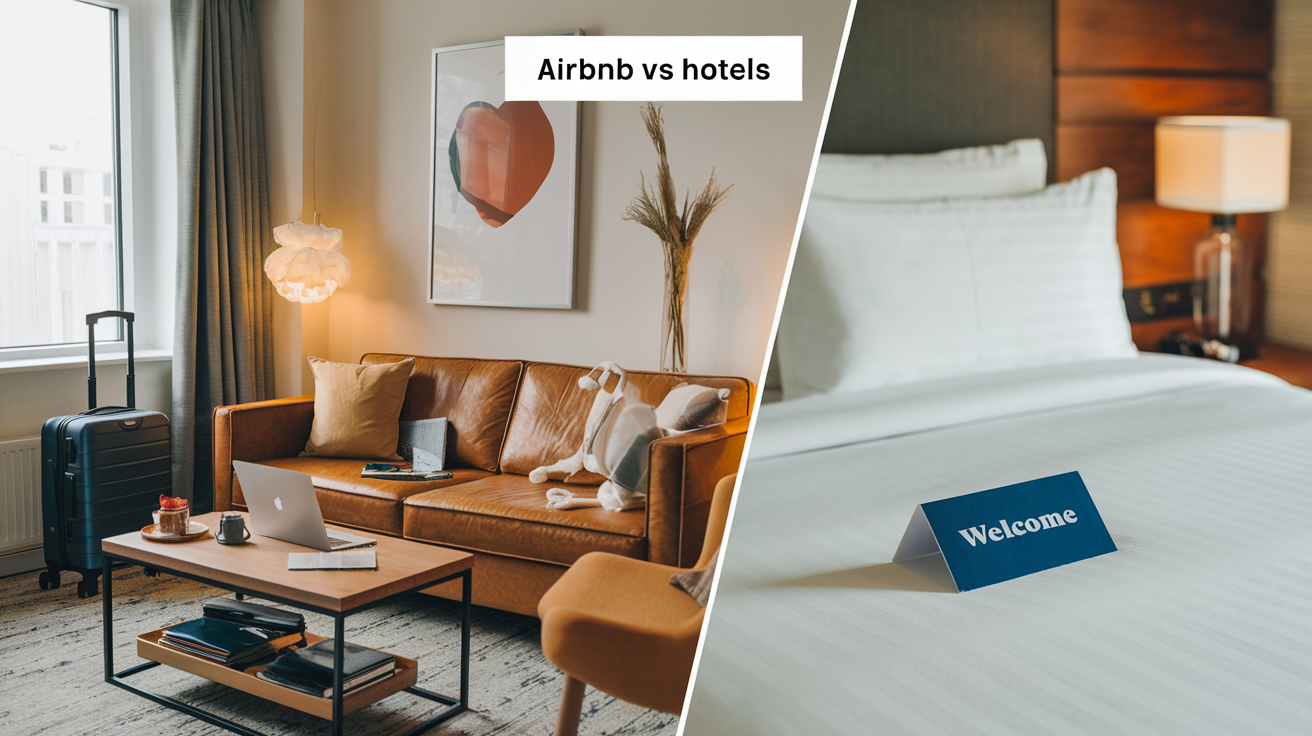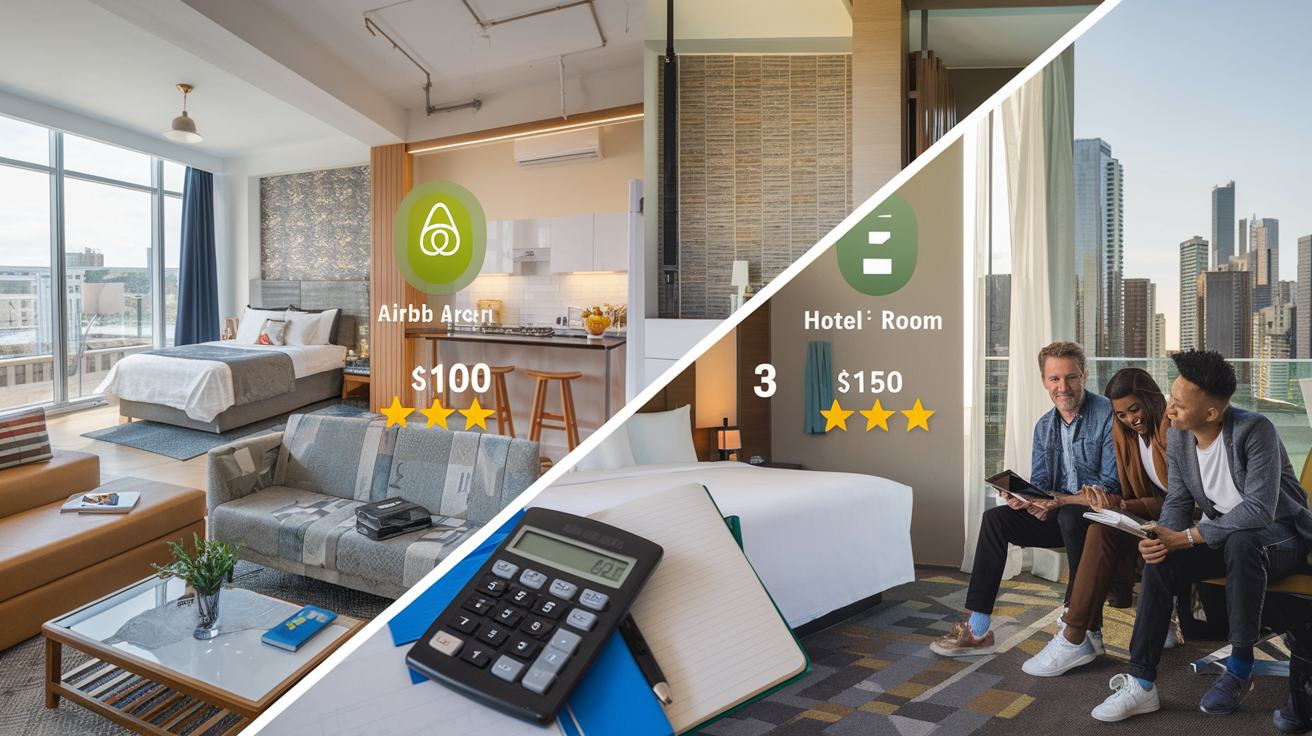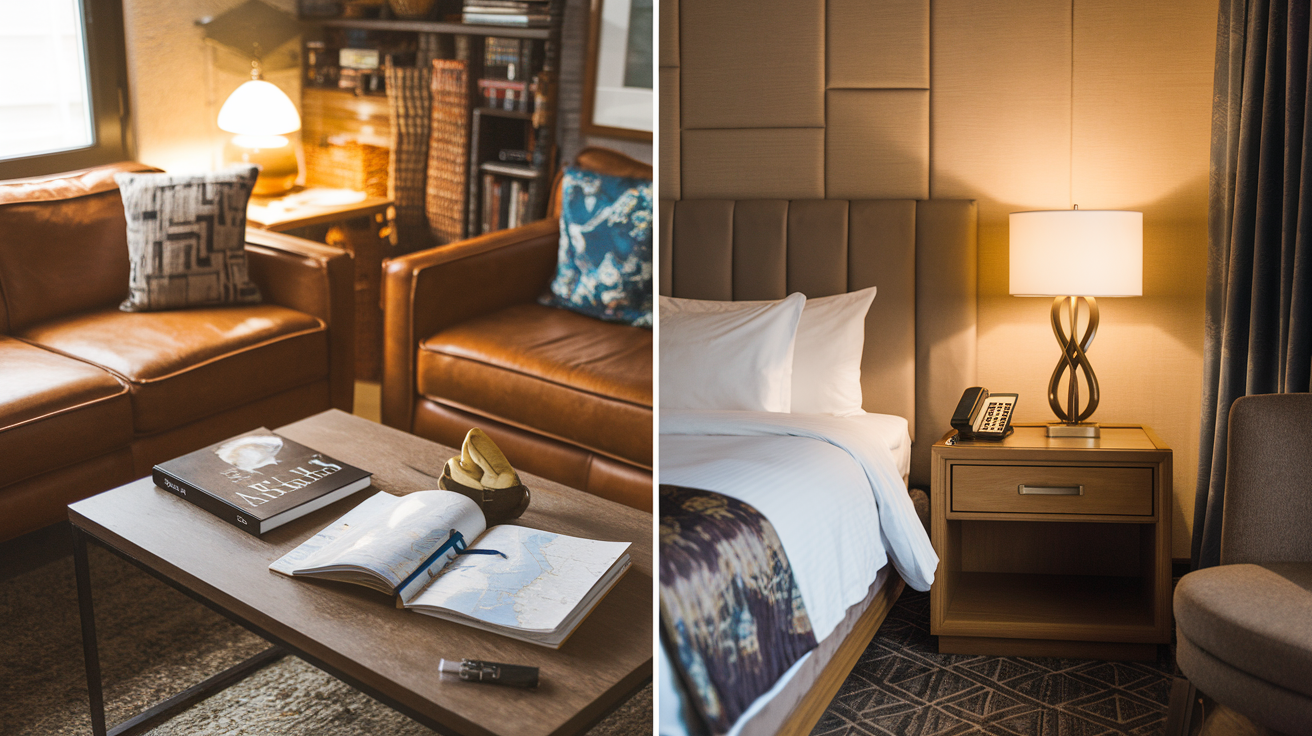Physical Address
30 N Gould St Ste N Sheridan, WY 82801
Physical Address
30 N Gould St Ste N Sheridan, WY 82801


Planning your next trip? 🌴✈️ The age-old question of where to stay just got more complicated with the rise of Airbnb. As travelers, we’re now faced with a choice that can significantly impact our experience and budget: Airbnb or traditional hotels?
This decision isn’t just about finding a place to sleep; it’s about shaping your entire travel experience. Airbnb offers unique rentals that promise a taste of local living, often at a lower cost. But hotels counter with luxury amenities and reliable service. So, which truly offers better value? 🤔
In this post, we’ll dive deep into the Airbnb vs. Hotels debate, exploring everything from cost comparisons to traveler preferences. We’ll uncover the hidden advantages of each option, examine how they impact your travel experience, and provide you with the insights you need to make the best choice for your next adventure. Whether you’re a budget-conscious backpacker or a luxury-seeking tourist, get ready to discover which accommodation type will give you the most bang for your buck! 💼🏨🏠

Airbnb and hotels represent two distinct approaches to accommodation in the travel industry. Airbnb is a platform that connects travelers with hosts who offer their private spaces for short-term rentals. These spaces can range from shared rooms to entire homes. Hotels, on the other hand, are traditional establishments that provide standardized rooms and services to guests.
The business models of these two options differ significantly:
| Aspect | Airbnb | Hotels |
|---|---|---|
| Ownership | Properties owned by individual hosts | Owned by companies or franchises |
| Management | Hosts manage their own listings | Professional staff manages operations |
| Pricing | Dynamic, set by hosts | Standardized, with some fluctuations |
| Experience | Often unique and personalized | Consistent and predictable |
Both Airbnb and hotels generate revenue, but their methods vary:
Airbnb:
Hotels:
The types of accommodations offered by Airbnb and hotels differ significantly:
Airbnb options:
Hotel options:
Airbnb provides a broader range of options, catering to various preferences and group sizes. Hotels, while more limited in variety, offer consistent quality and standardized amenities across their rooms.
With this understanding of the fundamental differences between Airbnb and hotels, we can now explore the specific advantages that Airbnb offers to travelers in the next section, “Advantages of Airbnb.”

Now that we’ve explored the basics of Airbnb and hotels, let’s delve into the advantages that Airbnb offers to travelers.
Airbnb provides a unique opportunity for cost-conscious travelers to save money while enjoying comfortable accommodations. The platform offers a wide range of rental options at various price points, often more affordable than traditional hotel stays. For example:
| Airbnb Cost Savings | Description |
|---|---|
| Travel stipend | Employees receive $2,000 annually for Airbnb stays |
| Flexible options | Diverse rental choices to fit different budgets |
| Home-like amenities | Potential for cost savings on meals and laundry |
One of Airbnb’s standout features is the variety of accommodations available:
This diversity allows travelers to find spaces that suit their specific needs and preferences, often providing a more personalized experience than standardized hotel rooms.
Staying in an Airbnb often means immersing oneself in local neighborhoods, offering:
This aspect of Airbnb aligns with the company’s emphasis on fostering community and belonging, as reflected in their corporate culture.
Airbnb rentals frequently offer more space and amenities compared to typical hotel rooms:
These features contribute to a more comfortable, home-like environment, particularly beneficial for longer stays or family travel.
With these advantages in mind, we’ll next explore how hotels stack up in comparison, examining their unique benefits for travelers.

Now that we’ve explored the advantages of Airbnb, let’s shift our focus to the benefits that hotels offer to travelers. While Airbnb has its unique charm, hotels provide a distinct set of advantages that cater to various traveler preferences and needs.
Hotels excel in offering a wide array of luxury services and amenities that enhance the overall travel experience:
These amenities provide a more polished and professional atmosphere, making hotels particularly attractive for short-term stays, romantic getaways, and business travel.
One of the primary advantages of hotels is their commitment to guest safety:
Travelers often perceive hotels as more secure due to these measures, offering peace of mind during their stay.
Hotels pride themselves on delivering consistent quality and customer service:
This consistency allows repeat travelers to know what to expect regardless of location, providing a reliable and comfortable experience.
Hotels offer additional benefits through their loyalty programs and reservation policies:
| Feature | Advantage |
|---|---|
| Loyalty points | Accumulate rewards for future stays |
| Room upgrades | Potential for better accommodations |
| Flexible cancellations | More favorable policies than Airbnb |
| Last-minute bookings | Easier to accommodate without host approval |
These programs can significantly enhance comfort and reduce costs, especially for families traveling together or frequent travelers.
With these advantages in mind, next, we’ll delve into a comparison of costs and value between hotels and Airbnb to help you make an informed decision for your next trip.

Now that we’ve explored the advantages of hotels, let’s delve into the crucial aspect of comparing costs and value between Airbnb and hotels.
Airbnb and hotels have distinct pricing structures due to their fundamental differences:
| Aspect | Airbnb | Hotels |
|---|---|---|
| Ownership | Privately owned rentals | Formal businesses |
| Management | Managed by hosts | Professional management |
| Overhead | Lower overhead costs | Higher operational expenses |
Airbnb’s lower overhead costs often translate to more affordable rates for travelers. Hotels, on the other hand, typically have higher operational expenses, which can result in higher nightly rates.
While Airbnb may seem more cost-effective at first glance, it’s essential to consider additional fees:
Travelers should carefully review the total cost, including all fees, when comparing Airbnb and hotel options to ensure they’re getting the best value for their money.
For extended stays, Airbnb often provides better value:
Hotels, while generally more expensive for long-term stays, may offer loyalty programs that provide benefits for frequent travelers.
When comparing costs and value, it’s crucial to consider the length of stay, desired amenities, and overall travel experience. These factors, along with pricing, play a significant role in determining which option offers better value for individual travelers.
With this cost comparison in mind, next, we’ll explore the various factors that influence a traveler’s choice between Airbnb and hotels, considering personal preferences and specific travel needs.

Now that we’ve compared the costs and value of Airbnb and hotels, let’s explore the key factors that influence a traveler’s choice between these accommodation options.
The duration of your trip plays a crucial role in deciding between Airbnb and hotels:
| Length of Stay | Preferred Option | Reasons |
|---|---|---|
| Short-term | Hotels | Enhanced safety, 24/7 customer service |
| Long-term | Airbnb | Potential discounts, spacious living arrangements |
The number of travelers and their relationships affect the choice:
Different travelers prioritize various amenities:
Consider which amenities are essential for your trip and choose accordingly.
The reason for your trip significantly impacts your accommodation choice:
When considering these factors, it’s important to remember that individual preferences play a significant role. In the next section, we’ll delve deeper into traveler preferences and how they determine the suitability of each accommodation option for different types of trips.

Now that we’ve explored the factors influencing choice between Airbnb and hotels, let’s delve into how different traveler preferences and situations impact suitability.
For short-term stays, hotels often emerge as the preferred choice. They excel in providing:
Conversely, Airbnb rentals shine for long-term stays, offering:
| Traveler Type | Preferred Option | Key Benefits |
|---|---|---|
| Luxury Seekers | Hotels | Professional service, high-end amenities |
| Budget-Conscious | Airbnb | Affordability, variety of price points |
Research indicates that luxury seekers tend to gravitate towards hotels for their polished atmosphere and premium services. On the other hand, budget-conscious travelers often find Airbnb’s diverse price range more appealing.
Independent travelers typically prefer Airbnb for:
Those seeking full service usually opt for hotels, benefiting from:
Families and large groups often find Airbnb more suitable due to:
Solo travelers or couples may lean towards hotels for:
As we transition to discussing the impact on travel experience, it’s clear that the choice between Airbnb and hotels significantly influences how travelers interact with their destination and the overall feel of their trip.

Now that we’ve explored traveler preferences and suitability, let’s delve into how the choice between Airbnb and hotels impacts the overall travel experience.
Airbnb offers a unique opportunity for travelers to immerse themselves in local culture and experiences. Through Airbnb’s Experiences program, launched in 2016, visitors can connect with local hosts who provide authentic insights into their regions. This program offers over 100,000 experiences across eight main categories:
These experiences allow travelers to engage in activities that reflect local traditions and customs, such as:
While Airbnb offers unique experiences, hotels often provide a higher level of convenience and consistent comfort. The choice between the two depends on individual preferences:
| Aspect | Airbnb | Hotels |
|---|---|---|
| Check-in | May require coordination with host | 24/7 front desk service |
| Amenities | Varies by property | Standardized across rooms |
| Housekeeping | Often limited or additional cost | Daily service included |
| Concierge | Host may provide local tips | Professional concierge available |
The social aspect of travel differs significantly between Airbnb and hotels:
With this understanding of how Airbnb and hotels impact the travel experience, we’ll next explore the crucial considerations for making the final decision between these accommodation options.

Now that we have explored the impact of choosing Airbnb or hotels on the travel experience, let’s delve into the important considerations for making an informed decision.
Customer reviews play a crucial role in the decision-making process for both Airbnb and hotel accommodations. When evaluating reviews, travelers should focus on:
It’s important to note that subjective norms, or the opinions of others, significantly influence revisit intentions for both Airbnb and hotel guests. However, their impact on customer loyalty varies between the two accommodation types.
To make an informed decision, travelers should compare options across different platforms:
| Comparison Factors | Airbnb | Hotels |
|---|---|---|
| Cost | Generally more affordable, especially for longer stays | Often higher priced, with potential added fees |
| Location | Can offer unique, less touristy areas | Typically in central, busy locations |
| Amenities | Varies widely, often includes kitchen and laundry | Standardized amenities, may lack kitchen facilities |
| Experience | Unique and personalized | Consistent and predictable |
When comparing, consider that Airbnb listings with entire homes command a 141% premium over shared rooms, while private rooms are priced 28% higher. Additionally, factors such as cleanliness fees, number of photos, and special features like handicap accessibility can influence pricing.
Travelers should evaluate their personal preferences and needs, considering:
Research shows that attitudes towards accommodations significantly affect loyalty for Airbnb guests but not for hotel guests. This suggests that Airbnb’s unique social appeal enhances customer loyalty, which may be an important factor for some travelers.
By carefully considering these factors and leveraging the wealth of information available through reviews and comparisons, travelers can make a well-informed decision between Airbnb and hotels that best suits their individual needs and preferences.

The choice between Airbnb and hotels ultimately depends on individual traveler preferences and needs. Airbnb often offers more affordable options, unique accommodations, and a local living experience, making it ideal for longer stays or larger groups. Hotels, on the other hand, provide luxury services, consistent amenities, and enhanced security, which can be preferable for short-term trips or business travel.
When deciding between the two, consider factors such as length of stay, desired amenities, and overall travel experience. Both options have their merits, and the best choice will vary depending on your specific circumstances. To make an informed decision, always compare prices, read customer reviews, and weigh the value of the experiences offered by each accommodation type. Ultimately, whether you choose an Airbnb or a hotel, prioritize the option that best aligns with your travel goals and enhances your overall journey.